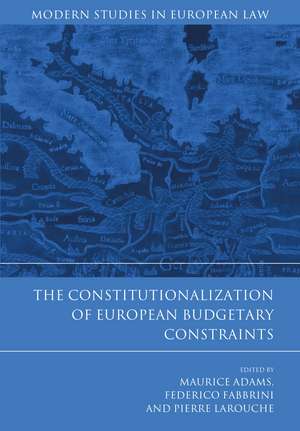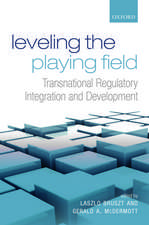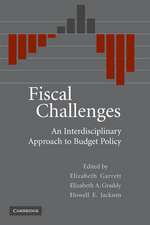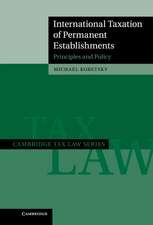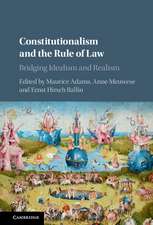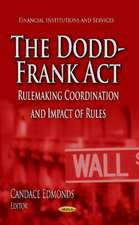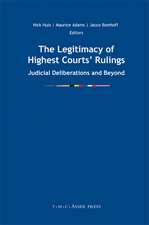The Constitutionalization of European Budgetary Constraints: Modern Studies in European Law
Editat de Professor Maurice Adams, Federico Fabbrini, Pierre Laroucheen Limba Engleză Hardback – 13 apr 2014
| Toate formatele și edițiile | Preț | Express |
|---|---|---|
| Paperback (1) | 269.31 lei 6-8 săpt. | +102.18 lei 7-11 zile |
| Bloomsbury Publishing – 29 iun 2016 | 269.31 lei 6-8 săpt. | +102.18 lei 7-11 zile |
| Hardback (1) | 574.92 lei 6-8 săpt. | |
| Bloomsbury Publishing – 13 apr 2014 | 574.92 lei 6-8 săpt. |
Din seria Modern Studies in European Law
- 30%
 Preț: 575.75 lei
Preț: 575.75 lei - 24%
 Preț: 440.21 lei
Preț: 440.21 lei - 31%
 Preț: 594.77 lei
Preț: 594.77 lei - 30%
 Preț: 570.22 lei
Preț: 570.22 lei -
 Preț: 181.55 lei
Preț: 181.55 lei - 30%
 Preț: 541.93 lei
Preț: 541.93 lei - 30%
 Preț: 507.97 lei
Preț: 507.97 lei - 30%
 Preț: 790.77 lei
Preț: 790.77 lei - 34%
 Preț: 509.45 lei
Preț: 509.45 lei - 30%
 Preț: 511.64 lei
Preț: 511.64 lei - 19%
 Preț: 296.91 lei
Preț: 296.91 lei - 30%
 Preț: 571.34 lei
Preț: 571.34 lei - 19%
 Preț: 296.72 lei
Preț: 296.72 lei - 11%
 Preț: 375.73 lei
Preț: 375.73 lei - 30%
 Preț: 539.57 lei
Preț: 539.57 lei - 30%
 Preț: 595.65 lei
Preț: 595.65 lei - 27%
 Preț: 475.10 lei
Preț: 475.10 lei - 30%
 Preț: 572.80 lei
Preț: 572.80 lei - 30%
 Preț: 721.14 lei
Preț: 721.14 lei - 18%
 Preț: 320.53 lei
Preț: 320.53 lei - 18%
 Preț: 321.66 lei
Preț: 321.66 lei - 30%
 Preț: 600.57 lei
Preț: 600.57 lei - 19%
 Preț: 317.21 lei
Preț: 317.21 lei - 30%
 Preț: 571.34 lei
Preț: 571.34 lei -
 Preț: 464.01 lei
Preț: 464.01 lei -
 Preț: 239.77 lei
Preț: 239.77 lei - 30%
 Preț: 538.03 lei
Preț: 538.03 lei - 23%
 Preț: 418.50 lei
Preț: 418.50 lei - 29%
 Preț: 587.97 lei
Preț: 587.97 lei - 30%
 Preț: 774.62 lei
Preț: 774.62 lei - 30%
 Preț: 570.43 lei
Preț: 570.43 lei - 30%
 Preț: 574.10 lei
Preț: 574.10 lei - 28%
 Preț: 495.80 lei
Preț: 495.80 lei - 30%
 Preț: 575.33 lei
Preț: 575.33 lei - 30%
 Preț: 571.24 lei
Preț: 571.24 lei - 30%
 Preț: 510.34 lei
Preț: 510.34 lei - 20%
 Preț: 219.19 lei
Preț: 219.19 lei - 30%
 Preț: 601.69 lei
Preț: 601.69 lei - 30%
 Preț: 513.60 lei
Preț: 513.60 lei - 18%
 Preț: 305.72 lei
Preț: 305.72 lei - 30%
 Preț: 972.83 lei
Preț: 972.83 lei - 30%
 Preț: 515.24 lei
Preț: 515.24 lei - 30%
 Preț: 539.99 lei
Preț: 539.99 lei - 30%
 Preț: 570.83 lei
Preț: 570.83 lei - 30%
 Preț: 571.82 lei
Preț: 571.82 lei - 29%
 Preț: 554.35 lei
Preț: 554.35 lei - 30%
 Preț: 572.06 lei
Preț: 572.06 lei - 13%
 Preț: 258.15 lei
Preț: 258.15 lei - 30%
 Preț: 574.59 lei
Preț: 574.59 lei
Preț: 574.92 lei
Preț vechi: 819.53 lei
-30% Nou
110.01€ • 115.39$ • 91.58£
Carte tipărită la comandă
Livrare economică 01-15 aprilie
Specificații
ISBN-10: 1849465800
Pagini: 444
Dimensiuni: 156 x 234 x 15 mm
Greutate: 0.84 kg
Ediția:New.
Editura: Bloomsbury Publishing
Colecția Hart Publishing
Seria Modern Studies in European Law
Locul publicării:London, United Kingdom
Caracteristici
Notă biografică
Maurice Adams is Professor of Democratic Governance and Rule of Law (vfund chair) and Professor of General Jurisprudence at Tilburg Law School. Federico Fabbrini is Assistant Professor of European and Comparative Constitutional Law at Tilburg Law School. Pierre Larouche is Professor of Competition Law and Director of Studies of the Bachelor Global Law at Tilburg Law School.
Cuprins
Foreword: Fiscal Capacity and Constitutional Reform in the EMU Miguel Poiares Maduro1 Introduction—The Constitutionalization of European Budgetary Constraints: Eff ectiveness and Legitimacy in Comparative Perspective Maurice Adams, Federico Fabbrini and Pierre LarouchePart 1 The New Constitutional Architecture of European Economic and Monetary Union2 Economic Governance and the Euro Crisis: Constitutional Architecture and Constitutional Implications Paul Craig3 The Use of International Law as a Tool for Enhancing Governance in the Eurozone and its Impact on EU Institutional Integrity Angelos Dimopoulos4 Diff erentiated Economic Governance and the Reshaping of Dominium Law Kenneth A Armstrong5 EU Fiscal Governance and the Eff ectiveness of its Reform Alexandre de Streel6 Maastricht Revisited: Economic Constitutionalism, the ECB and the Bundesbank Marijn van der Sluis7 The Independence of the ECB after the Economic Crisis Stefania BaroncelliPart 2 The Constitutionalization of European Budgetary Constraints: Comparative Experiences8 (Un)Balanced Budget Rules in Europe and America Pieter-Augustijn Van Malleghem9 A Legalization of Financial Constitutions in the EU? Reflections on the German, Spanish, Italian and French Experiences Giacomo Delledonne10 Fiscal Stability Rules in Central European Constitutions Marek Antoš11 Can Constitutional Rules, Even if 'Golden', Tame Greek Public Debt? Lina Papadopoulou12 Mandatory Balanced Budget in Dutch Legislation Following Examples Abroad? Michal Diamant and Michiel van Emmerik13 An Analysis of the Method and Efficacy of Ireland's Incorporation of the Fiscal Compact Roderic O'GormanPart 3 Towards a Genuine EMU: Democracy, Legitimacy and Integration14 Domestic Courts, Constitutional Constraints and European Democracy: What Solution for the Crisis? Ingolf Pernice15 National Parliaments' Say on the New EU Budgetary Constraints: The Case of Spain and Ireland Sonia Piedrafita16 Who Got to Adjudicate the EU's Financial Crisis and Why? Judicial Review of the Legal Instruments of the Eurozone Samo Bardutzky and Elaine Fahey17 Th e Impact of Stronger Economic Policy Co-ordination on the European Social Dimension: Issues of Legitimacy Francesco Costamagna18 Power and Legitimacy in the Eurozone: Can Integration and Democracy Be Reconciled? Peter L Lindseth19 From Fiscal Constraints to Fiscal Capacity: The Future of EMU and its Challenges Federico Fabbrini
Recenzii
Descriere
The recently enacted Treaty on the Stability, Coordination and Governance of the Economic and Monetary Union (generally referred to as the Fiscal Compact) has introduced a 'golden rule', which is a detailed obligation that government budgets be balanced. Moreover, it required the 25 members of the EU which signed the Treaty in March 2012, to incorporate this 'golden rule' within their national Constitutions. This requirement represents a major and unprecedented development, raising formidable challenges to the nature and legitimacy of national Constitutions as well as to the future of the European integration project. This book analyses the new constitutional architecture of the European Economic and Monetary Union (EMU), examines in a comparative perspective the constitutionalization of budgetary rules in the legal systems of the Member States, and discusses the implications of these constitutional changes for the future of democracy and integration in the EU. By combining insights from law and economics, comparative institutional analysis and legal theory, the book offers a comprehensive survey of the constitutional incorporation of new fiscal and budgetary rules across Europe and a systematic normative discussion of the legitimacy issues at play. It thus contributes to a better understanding of the Euro-crisis, of the future of the EU, and the reforms needed towards a deeper and genuine EMU.
